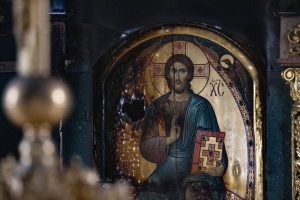
In March 2022, after Russia’s full-scale attack on Ukraine had begun, we published a series exploring the role of religion in the war. In that series, we argued that the religious component of the conflict has manifested itself in a variety of aspects: from religious justification and rhetoric employed by Russian President Vladimir Putin, to the perception of the war by Russian and Ukrainian Orthodox churches, to threats to religious freedom in territories under Russian control.
Commemorating the first-year anniversary of Russia’s invasion, we provide an update on these topics.
Jerry G. Pankhurst explores key problems of Eastern Orthodoxy reflected in the Russia-Ukraine war. Robert C. Blitt and Alar Kilp analyze the mythology of “civilizational struggle” (Blitt) and “sacred territory” (Kilp) that the Kremlin in concert with the Russian Orthodox Church (ROC) has been advancing in order to justify Russia’s attempts to conquer Ukraine. Regina Elsner’s piece is dedicated to the relationship between the ROC and the Ukrainian Orthodox Church (UOC), which is linked historically and ecclesiastically to the Moscow Patriarchate. She stresses that the UOC’s independence from the ROC can ultimately be gained through “the sincere theological turn from the destructive legacy of the ROC.”
Catherine Wanner elaborates on some of the factors that contribute to perceptions of trustworthiness of religious institutions within the context of war with Russia, and particularly how this affects attitudes toward the UOC. Andriy Fert shows us the complexity of the UOC’s internal tensions and challenges through the lens of an ordinary Orthodox priest, who was interviewed by Fert in the winter of 2023.
Finally, Dmytro Vovk and Michelle Coleman focus on religious freedom, human rights, and the war. Based on the case of the UOC, Vovk explores how the first year of the war has changed both President Zelensky’s attitude toward inter-Orthodox competition and church-state relations in Ukraine. Given reports of religious leaders being tortured and murdered by the Russian military and mass destruction of religious properties due to Russian attacks, Coleman explains the role of NGOs in collecting evidence for future international trials.
Posts in the Series:
Jerry G. Pankhurst. Both Symptom and Cause: Four Problems in Eastern Orthodoxy Reflected in the Ukraine War
Robert C. Blitt. Russia’s Constitutionalized Civilizational Identity and the Moscow Patriarchate’s War on Ukraine
Alar Kilp. The Role of the ROC in the Sacralization of Secular Imperial Nationalism
Regina Elsner. No End to the Dead End? The Difficult Relationship Between the Ukrainian Orthodox Church and the Moscow Patriarchate
Catherine Wanner. The Effects of War and Collaboration on Trust in Ukraine
Andriy Fert. Between Scylla and Charybdis: The Ukrainian Orthodox Parish During the War
Dmytro Vovk. Not My Church: Ukraine’s New Draft Law Dealing with the Ukraine Orthodox Church of (not) the Moscow Patriarchate
Michelle Coleman. The War and Religion in Ukraine: The Role of NGOs in Evidence Collection for Future International Trials
